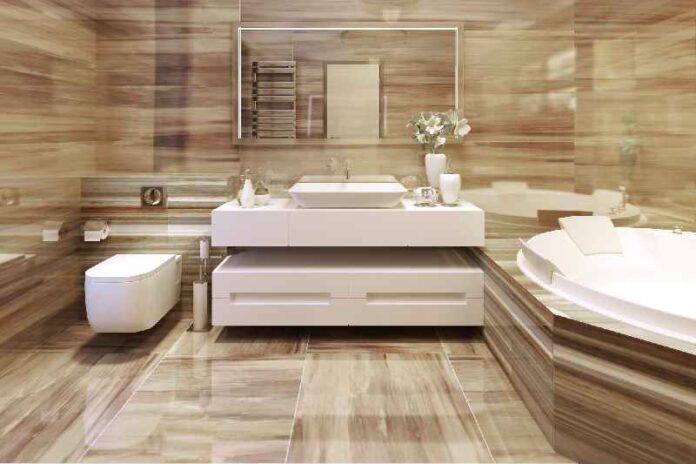
Selecting the right natural stone for your bathroom floors is a significant decision that can dramatically influence the look and feel of your space. Natural stone flooring adds a touch of elegance and luxury, transforming your bathroom into a serene retreat.
This guide aims to assist you in navigating through various natural stone options to find the perfect fit for your bathroom’s aesthetic and functional requirements.
Benefits of Natural Stone for Bathroom Floors
Incorporating natural stone into your bathroom flooring offers a multitude of benefits, not only enhancing its beauty but also increasing the overall value of your home. Here’s why natural stone stands out as a superior flooring choice:
- Durability and Longevity: Natural stone is renowned for its strength and durability. It can withstand the test of time, resisting wear and tear from daily use, which makes it an ideal choice for high-traffic areas like bathrooms.
- Unique Aesthetic Appeal: Each piece of natural stone is unique, offering diverse patterns, colors, and textures. This uniqueness allows for the creation of distinctive and luxurious bathroom floors that are impossible to replicate with synthetic materials.
- Increases Property Value: Bathrooms with natural stone flooring are often perceived as high-end, significantly boosting the overall value of your property. It’s an investment that pays dividends in both aesthetics and market value.
- Easy to Maintain: Despite misconceptions, natural stone flooring is relatively easy to maintain. Regular sealing and simple cleaning routines can keep your stone flooring looking pristine for years.
- Natural and Eco-Friendly: Choosing natural stone is an environmentally friendly option. It’s a sustainable resource that doesn’t emit VOCs into your home, contributing to healthier indoor air quality.
Types of Natural Stone for Bathroom Floors
When it comes to selecting natural stone for bathroom floors, there are several options each with its unique characteristics and benefits:
- Marble Stone Flooring: Marble is synonymous with luxury and sophistication. Its veining patterns and wide color spectrum can complement any bathroom decor.
- Granite: Known for its durability and resistance to moisture, granite is an excellent choice for bathrooms. It’s less porous than marble, making it more resilient against stains and requiring less frequent sealing.
- Limestone: Limestone offers a softer, more earthy appearance, ideal for creating a warm and inviting bathroom atmosphere. It does require sealing to protect against moisture and staining.
- Travertine: Travertine provides a timeless look with its unique pitted surface and earth-toned colors. It’s durable but requires filling and regular sealing to maintain its beauty and resist water damage.
- Slate: Slate is highly durable and slip-resistant, making it a safe choice for bathroom floors. It comes in darker shades, which are excellent for hiding dirt and stains.
- Quartzite: Quartzite offers the look of marble with the durability of granite. It’s resistant to moisture and scratches, making it a practical yet beautiful choice for bathroom flooring.
How to Choose the Right Natural Stone Tiles for Bathroom
Selecting the right natural stone tiles involves several considerations to ensure they meet both your aesthetic preferences and practical needs:
- Consider the Overall Design: The stone you choose should complement the color scheme and style of your bathroom. Consider how the natural stone flooring will match with the walls, fixtures, and accessories.
- Evaluate Durability and Maintenance: Think about how much traffic your bathroom gets and choose a stone that can withstand it. Also, consider how much time and effort you’re willing to invest in maintenance.
- Slip Resistance: Safety is paramount in a bathroom. Opt for natural stone tiles with a textured surface or choose smaller tiles that offer more grout lines, which can provide better slip resistance.
- Sealing and Waterproofing: Most natural stones are porous and require sealing to prevent water damage and staining. Ensure you’re prepared for the upkeep that your chosen stone demands.
- Budget: Natural stone can vary widely in price. Set a budget but be prepared to invest in quality. Remember, natural stone flooring can increase the value of your home, making it a worthwhile expenditure.
FAQs
Which natural stone is best for bathroom floor?
Marble and granite are popular choices for their beauty and durability, but slate and quartzite offer excellent moisture resistance and durability, making them ideal for bathrooms.
What is the best stone to use in a bathroom?
The best stone depends on your design preferences and practical needs. Granite and quartzite are highly durable and moisture-resistant, while marble offers unparalleled elegance.
What is the most durable natural stone floor?
Granite stands out as one of the most durable natural stone flooring options, offering excellent resistance to scratches, stains, and moisture.
Is natural stone more expensive than tile?
Yes, natural stone is generally more expensive than ceramic or porcelain tile due to its natural origins, mining process, and the uniqueness of each piece. However, its durability, aesthetic appeal, and ability to increase property value often justify the higher cost.





